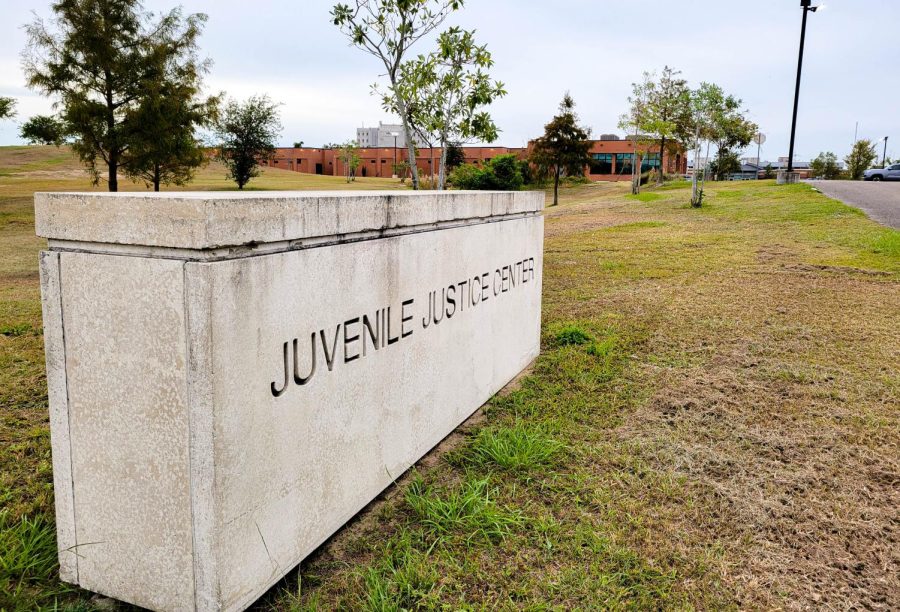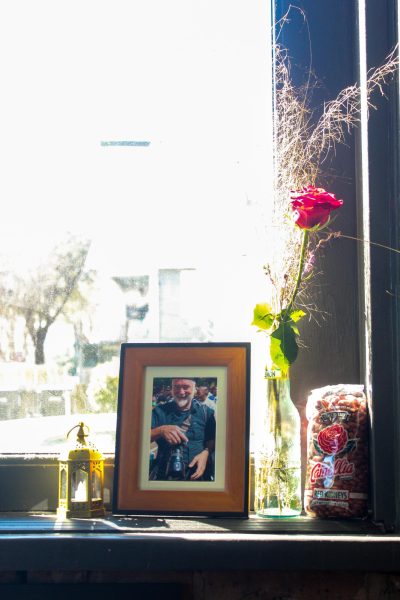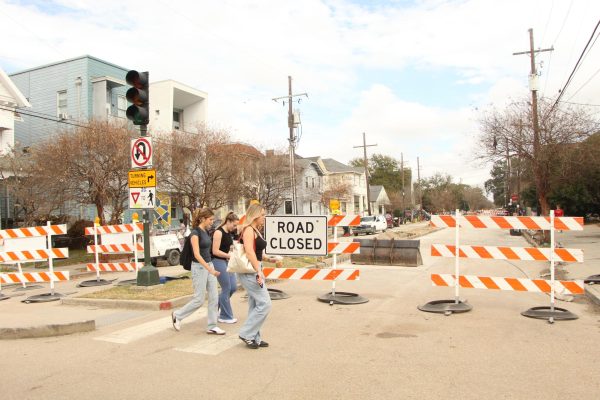Loyola Law Clinic sues for protection of juveniles
The sign for the Juvenile Justice Center sits along the drive to its entrance in New Orleans, LA on Nov. 4, 2021. The Juvenile Justice Center evacuated 36 juveniles to an adult center during Hurricane Ida.
During the six days they were alongside adults in prison during the aftermath of Hurricane Ida, incarcerated teenagers said they were hungry and alone. Their families said they didn’t know where they were and that their kids couldn’t shower, eat a nutritious meal, or talk to their lawyers.
The city transferred 36 teens from New Orleans’ Juvenile Justice Intervention Center to the Elayn Hunt Correctional Center in St. Gabriel, Louisiana as part of its emergency evacuation plan for incarcerated youth Aug. 27.
The Loyola Law Clinic has filed a lawsuit on behalf of the advocacy group, Friends and Family of Louisiana’s Incarcerated Children, against the city of New Orleans to gain what they call justice for the children and families that were allegedly mistreated during the evacuation, the clinic said in a press release.
Friends and Family of Louisiana’s Incarcerated Children Executive Director, Gina Womack, said that parents and children involved in the evacuation experienced significant trauma.
“Families did not know where their children were taken in the midst of a historic storm and pandemic,” Womack said.
In addition to not being notified that their children were evacuated, Womack said parents were denied direct communication with their children and that they were only speaking to their children through a third party.
“When parents were able to talk to their kids, they heard the fear from their young people. What some of the young people were saying is that they were afraid and that this was an awful place they were evacuated to. They said that they barely ate any food, really didn’t get access to showers, and they had seen of the adult folks that were housed there too,” she said.
Hector Linares, coordinator of skills and experiential learning and clinic professor of the Loyola Law Clinic, is another party directly involved in the handling of this lawsuit. Linares said that the city’s current evacuation plan “is not safe, physically or emotionally.” He said the Loyola Law Clinic aims to aid in developing the best practices to ensure juvenile safety through the lawsuit.
“It’s not complicated to develop a plan that evacuates youth during an emergency to a licensed facility,” Linares said.
Linares said that the city’s evacuation is in violation of Louisiana Children’s Code, which aims to ensure legal due process for children and parents. Specifically, he said that the plan is in violation of Article 822, as this is the statute that handles where youth detained during delinquency proceedings can be placed.
Linares said that the city’s plan was in violation of Article 822 because the facility the youth were placed in was designated for incarcerated adults and was unlicensed to hold children, and the youth have not been found guilty or gone through due process.
The New Orleans Juvenile Justice Intervention Center’s Emergency Operations Plan outlines the evacuation plans for incarcerated children. The 2021 plan stated that its purpose is to safely relocate the Juvenile Justice Intervention Center’s operations and plan and coordinate all resources needed to successfully resume operations at an alternate location.
The plan does not mention any specific guidelines or locations in reference to facilities where incarcerated children would be evacuated.
The Maroon contacted the city’s communication team on Oct. 17. John F. Lawson from the mayor’s Office of Communications declined to interview on behalf of the city. Lawson said the city has no comment at this time regarding the referenced lawsuit and said they do not comment on active or pending litigation.
However, Executive Director Kyshun Webster Sr. said in a statement that the Juvenile Justice Intervention Center evacuation 2021 plan was submitted to and approved by the Department of Children Family Services.
“In coordination with the state, the Juvenile Justice Intervention Center took every precaution to ensure the health, welfare and safety of juvenile offenders in anticipation of Hurricane Ida’s landfall and in accordance with timely submitted emergency evacuation plans,” Webster said.
This instance is not the first time questions have been raised about the safety of juveniles during an evacuation. According to the New York Times, more than 100 incarcerated teenagers were essentially left to fend for themselves without sanitary food or water in the wake of Hurricane Katrina. Womack was active in her same general field of work during Hurricane Katrina.
“As the floodwaters rose, children were abandoned in cages. I would have thought having had that happen much greater care would be taken with human lives, especially children,” she said.
Linares said detention centers were not required to be specifically licensed to handle children before Katrina. Both Linares and Womack agree that the evacuation events which took place during Hurricane Ida reflect a failure to learn from the mistakes and failures of Katrina’s evacuation policy, specifically in regards to incarcerated juveniles.
Womack said through this lawsuit the Friends and Family of Louisiana’s Incarcerated Children aim to hold the juvenile justice system accountable.
“We want to help create a better life for all the youth in Louisiana, especially those impacted by the criminal justice system,” Womack said.

Ava Acharya is currently the Assistant News Editor at the Maroon. She has written for the Maroon numerous times. She is a Mass Communication major with...

Jackie Galli is proud to be one of the editors in chief at The Maroon this year. She is a senior mass communication major with a concentration in journalism,...






deb • Nov 20, 2021 at 8:34 pm
11/20/’21-I never believed in an end of our world..but Whomever wrote a law if it is that a country can’t be held responsible for offending another is off it’s rocker. Some group, country, organization HAS to be HELD responsible for what has happened by this upside down & sideways & in some cases Deadly MESS. DONE!